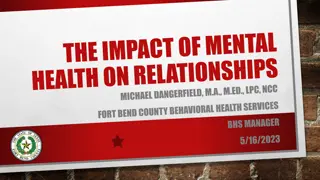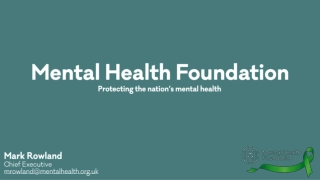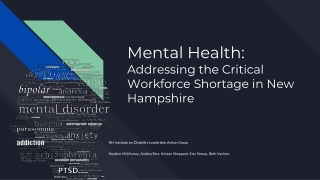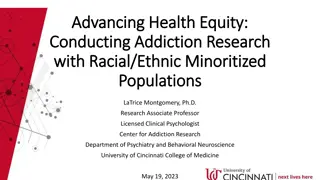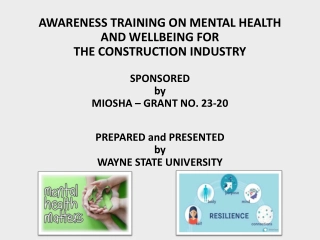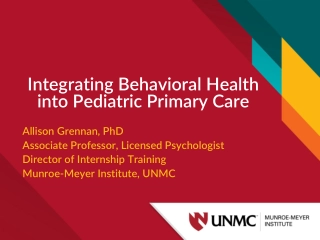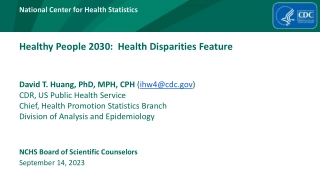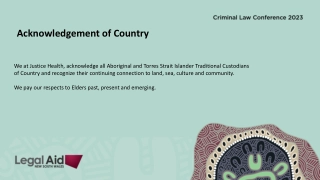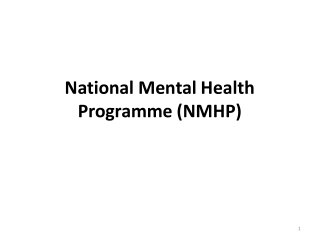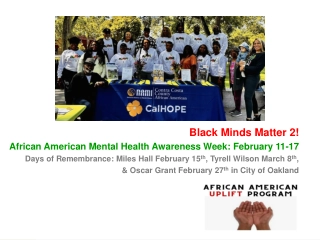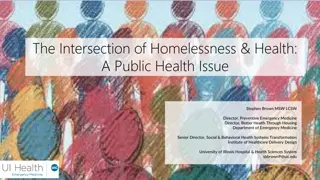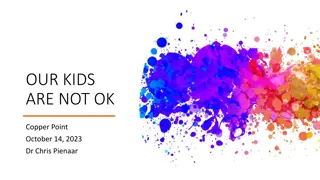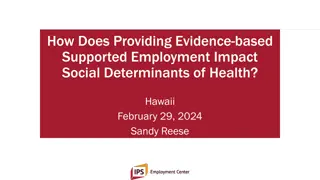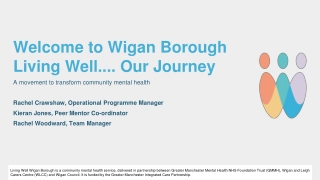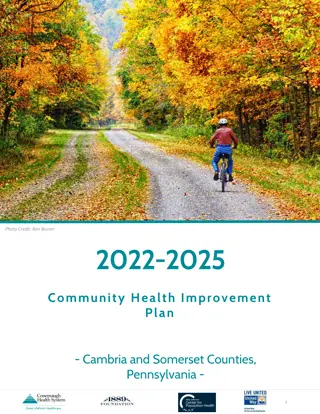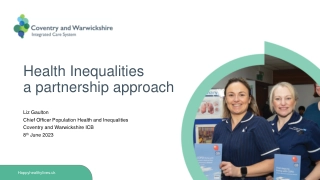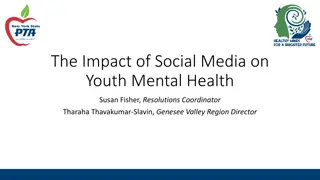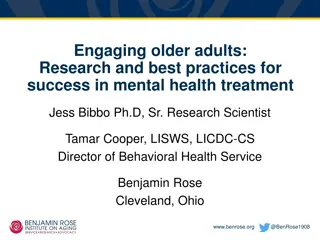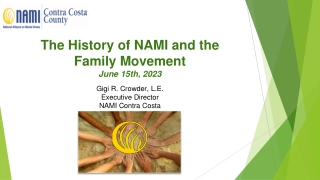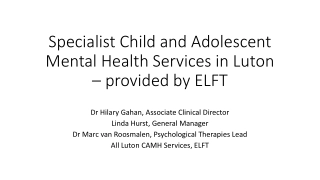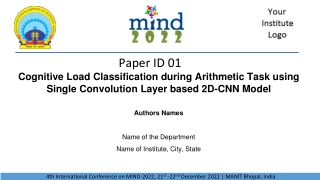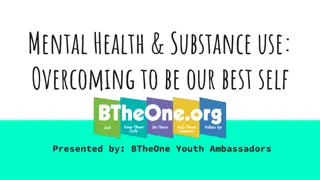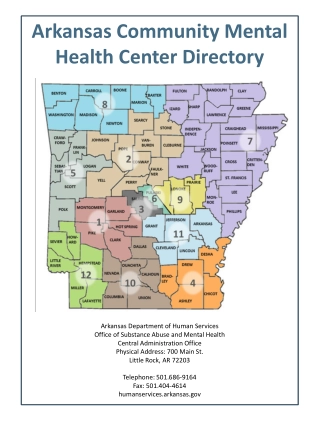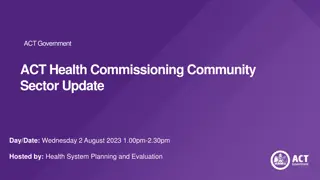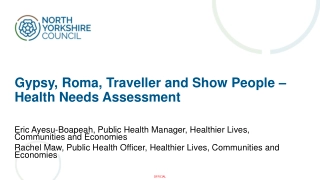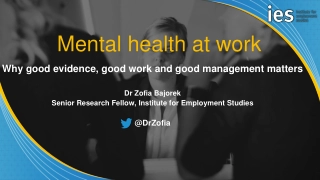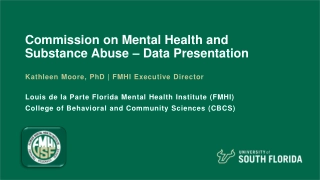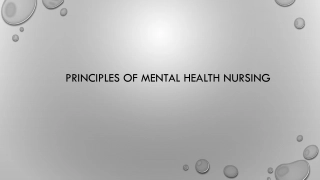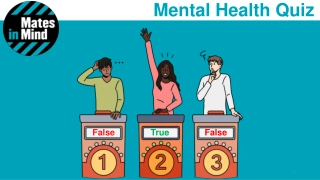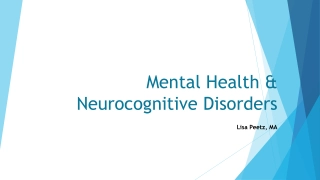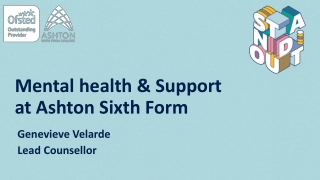Addressing Mental Health Disparities in Academia for BIPOC Individuals
Factors impacting BIPOC mental health include limited access to quality care, cultural mistrust, discrimination, stigma, and lack of awareness. BIPOC individuals in academia face additional stress due to questions about their abilities and worthiness. Historical contexts influence mental health interventions, and the COVID-19 pandemic has prompted telehealth use. The socio-ecological model highlights complex social influences on BIPOC mental wellness exacerbated by current social/political climates.
Addressing Mental Health Disparities in Academia for BIPOC Individuals
PowerPoint presentation about 'Addressing Mental Health Disparities in Academia for BIPOC Individuals'. This presentation describes the topic on Factors impacting BIPOC mental health include limited access to quality care, cultural mistrust, discrimination, stigma, and lack of awareness. BIPOC individuals in academia face additional stress due to questions about their abilities and worthiness. Historical contexts influence mental health interventions, and the COVID-19 pandemic has prompted telehealth use. The socio-ecological model highlights complex social influences on BIPOC mental wellness exacerbated by current social/political climates.. Download this presentation absolutely free.
Presentation Transcript
Addressing Mental Health and Wellness Needs of BIPOC Students & Faculty Beyond Well-Intentioned Efforts Aleesha N. Young, LPC, Psy.D.
Factors that Impact BIPOC Mental Heath & Wellness Reasons for these disparities: Limited access to quality mental health care, High cost of that care Cultural mistrust Discrimination Stigma about mental illness Lack of awareness about mental health problems Culturally disenfranchised groups across race/ethnicity are likely to have poorer mental health outcomes, even as they are less likely to receive needed services in the first place.
Stress and Social Pressures within Academia Being situated in academia is risky and creates greater hesitancy to share mental health challenges. Pre-text for questioning their abilities, value to the institution, and worthiness for promotion, tenure scholarships, etc. Faculty evaluations, especially those about multicultural and diversity issues, may elicit uncomfortable feelings in instructors, making BIPOC students easy targets for retaliation (even if unintended).
Framing the Problem: Historical Context of Mental Health Interventions Clinical/Counseling psychology interventions in the U.S. were developed within the historical context of Caucasian, Western, colonial hegemony, and thus cannot be applied to all individuals in the same way. Thus, psychological theories, treatment modalities, and research protocols were informed by White worldviews, and practiced in this way even by well-intentioned therapists.
Telehealth Prompted by COVID-19 Pandemic
Socio-Ecological Model BIPOC individuals affect and are affected by a complex range of social influences and nested environmental interactions.
Social/political climate among the COVID- 19 pandemic and police killings exacerbated mental health and wellness of BIPOC folx. Socio-Ecological Model BIPOC individuals affect and are affected by a complex range of social influences and nested environmental interactions. Verbal attacks and false accusations of Asian Pacific Islanders for spreading the disease.
If We Know Why the Problem Exists Why Are There Still Unmet Mental Health Needs for BIPOC Students & Faculty? Misguided approached to culturally responsive therapeutic practice. Even when practitioners intentionally work to disrupt oppressive paradigms, being a part of institutions and organizations that (inadvertently) perpetuate oppression is still part of the learning teaching, and practice of psychology that informs service delivery. What and whose perspectives are influencing therapeutic practice?
If We Know Why the Problem Exists Why Are There Still Unmet Mental Health Needs for BIPOC Students & Faculty? This requires practitioners to be very explicit in their understanding of environmental blocks and/or stressors. It also requires an understanding of social justice issues because, without fail, EVERY client is embedded within the overall environment.
Evidence of Culturally Responsive Mental Health Support Does your provider DELIBERATELY identify obstacles/systemic barriers that can interfere with or prevent access to treatment, treatment compliance, or lead to poorer treatment outcomes using an ecological model as shown here. ALWAYS identify demographic information and your marginalized and privileged identities, and list the resources available to them as a result. BELIEVE clients when they disclose experiences of oppression from a social justice perspective.
Remember Providers should not pathologize culturally-driven cognitions or behavior. Instead, they should focus on ACCURACY and goal-oriented EFFECTIVENESS from your standpoint. I don t fit in. I have to work much harder. The problem is not always you sometimes it s the oppressive dynamics in the environment!
Telehealth: Considerations for Culturally Responsive Mental Health Services Provider should consider protections for victims of Intimate Partner Violence Does your therapist or provider integrate questions about access to broadband internet into their intake practices? - Vulnerability of women of color, immigrant women, and those from the LGBTQ+ community. Multiculturally Friendly Office Space Does your provider display their gender pronouns or tell you what they are?
References Hays, P. A. (2019). Introduction. In Culturally responsive cognitive behavioral therapy: Practice and supervision (2nd ed.) (pp. 5-24). Washington, DC: The American Psychological Association. Iwamasa, G. Y., & Hays, P. A. (Eds.) (2019). Culturally responsive cognitive behavioral therapy: Practice and supervision (2nd ed.). Washington, DC: The American Psychological Association. Lee, D. L. & Tracey, T. (2008). General and multicultural case conceptualizations: A cross-sectional analysis of psychotherapy trainees. Psychotherapy Theory, Research, Practice, and Training, 45(4), 507- 522. https://doi.org/10.1037/a0014336 Young, A. & McCloskey, K.(2020, October 23-24). Case Conceptualization: When a Multicultural Approach is the Rule, Not the Exception. Workshop presented at the Annual Diversity Challenge (Virtual), Institute for the Promotion of Race and Culture, Boston College. Young, A.N. (2022). Guide to Providing Culturally Competent Behavioral Health Services via Telehealth. Practice Innovations. https://dx.doi.org/10.1037/pri0000173


